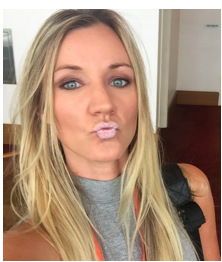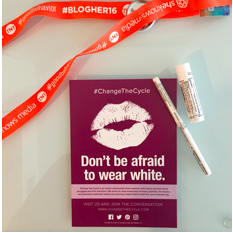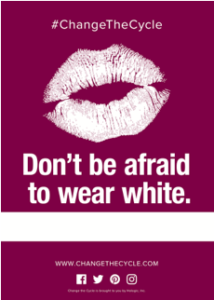Between pregnancy and breastfeeding, many women can escape their monthly period for a year or two or more! This can give us a much needed break and a whole new perspective on life without periods. Many people I have chatted with state that it always comes as a shock when it returns and has them thinking…was it this annoying before? I’ve compiled a list of 6 reasons why getting your period back after baby sucks! I’d love to hear some of the reasons you came up with in the comments below.


- You have better things to do
Let us be honest, in the midst of mom life sometimes changing my tampon is the last thing on my mind. There have been some nights where I can’t remember if I changed it recently or not, and other nights where I almost put a new one in without removing the old one (come on, I know I’m not the only one). Also, the struggle is real when trying to remember to pack tampons in our diaper bag. I’ve made far too many emergency stops at the drug store. I am not daring enough to try other forms of feminine products like a cup, so this is as good as it gets for now.
- Sanitary napkins are anything but sanitary
I have tried wearing panty liners before to save my cute underwear from being thrown in the garbage after some unexpected spotting or beginning of shark week. The problem is that not only do they bunch up and get uncomfortable, but the material mixed with sweat can actually cause an itchy reaction in places where no one wants to see you scratch. On a side note, I have tried some mommy cloth and those are like sitting on a cloud, bulky, but so so soft!
- Hormones can make you crazy
I don’t know if it’s the lack of sleep or stress or maybe just an increase in hormones, but PMS after a baby is the real deal. Add in some hormonal birth control and I’m nothing but a weepy mess for half the month. I’ll pass on that.
- You have to perfectly time bikini waxes
Before I got my period back, this was never an issue. I know some people don’t care, but I have no desire to go for a Brazilian while Aunt Flo is visiting. There has been a few times where my waxes have been long overdue because of canceled appointments, and all I have to say is…ouch.
- You’re always worried about leaking!
This wasn’t much of an issue before, but irregular periods after baby combined with a heavier flow has me afraid of wearing tight pants to the gym some days. Why can’t we just get our periods over and done with in ONE day a month? I would be totally okay with that.
- Sex life? What?
As many of us can agree, sex after baby is harder to come by and now that we’ve cut out another week each month sometimes I wonder if it will ever happen again. Mother nature, why are you making it so hard for me to get laid?
For me, my period is just an inconvenience that I am not used to. Unfortunately for the 1 in 5 women who experience heavy bleeding, periods can bring with them extreme fatigue, emotional distress, and other life-altering symptoms. Abnormal uterine bleeding impacts 10 million women a year in the US alone and can have serious affects on overall life.1-3

While at the #Blogher16 conference a few weekends ago I was introduced to Change the Cycle at the Hologic booth. I love their #daretowearwhite campaign and its way of bringing awareness to topics nobody wants to talk about. They were committed to helping women makeover the conversation about heavy bleeding, fibroids and polyps by providing free makeovers and white lipstick to catch people’s attention. They featured OBGYN Dr. Jessica Shepherd who was able to answer all questions and concerns about heavy bleeding and possible treatment options!
Visit changethecycle.com today to learn more about the treatments out there that can help. You’re not alone, and no one should have to plan their life around their monthly cycle.
This post is sponsored by changethecycle.com and the #daretowearwhite campaign.
References
- National Women’s Health Resource Center. Survey of women who experience heavy menstrual bleeding. Data on file; 2005.
- Association of Professors of Gynecology and Obstetrics, Medical Education Collaborative. APGO educational series on women’s health issues: clinical management of abnormal uterine bleeding. Crofton, MD; 2006.
- Centers for Disease Control and Prevention. Blood disorders in women: heavy menstrual bleeding. http://www.cdc.gov/ncbddd/blooddisorders/women/menorrhagia.html. Accessed September 24, 2015.
